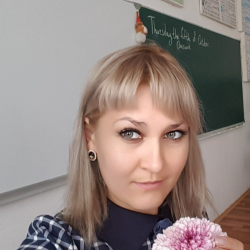8-А,8-Б (24.04.18) уч.англ.яз. Сидаш Эльвира Сергеевна
ТЕМА УРОКА: ИНТЕРЕСЫ И УВЛЕЧЕНИЯ
Тип урока: комбинированный
Цели:
Образовательные:- освоить лексику по теме «Увлечения» во всех видах речевой деятельности;
- научиться вести разговор о занятиях в свободное время;
- освоить употребление условных предложений в речи;
- совершенствовать навыки аудирования.
Развивающие: - развивать социокультурную компетенцию;
- развивать коммуникативные универсальные учебные действия;
- развивать навыки прогнозирования содержания текста.
Воспитательные: - мотивировать к изучению иностранного языка;
- воспитывать уважение к чувствам и интересам собеседника.
ХОД УРОКА
I. Подготовка к восприятию иноязычной речи
1.Приветствие и постановка цели урока.
Today we’ll summarize our knowledge on the topic “Leisure Time Activity”, we’ll develop our listening skill by watching a video and we’ll revise grammar material (Conditionals)
2. Warming up (mind-map)
a) T.: - Name some of the most popular ways of spending free time
(уч-ся выходят к доске и записывают фразы по теме:
camping, outings, fishing, travelling, picnics, playing games, dancing, going to the concerts, to the museums, reading books, going to the cinema, clubbing)
b) Т: - What are your favourite ways of spending leisure time?
II.ОСНОВНАЯ ЧАСТЬ УРОКА
1. Активизация лексики
(Match the word combinations)
to release the energy освобождать энергию
to make people free and happy делать людей свободными и счастливыми
to bring people together сплачивать людей
to let people become themselves позволять быть самим собой
to express the feeling выражать чувства
to unite people объединять людей
to stimulate senses развивать (стимулировать) чувства
to broaden horizons расширять горизонты
the feeling of togetherness чувство единства
1.e 2f 3i 4j 5g 6b 7a 8c 9d
2. Answer the teacher's questions:
1. What is clubbing?
2. Does clubbing help people to communicate with each other?
3. What countries is clubbing popular in?
4 What kinds of clubs do people join in?
5. Why do people like to go to the clubs?
6. What kind of people like to go to different clubs?
7. What clubs do you go to?
8. Why do you go there?
3.Grammar revision (Conditionals)
а) Повторение грамматической структуры «Условное предложение 2 типа» и закрепление в упражнении:
Grammar revision (put the verbs into the correct form.)
1. If I (want) _____ to learn painting I (go)_______ to the Art school.
2. If the water (be)_____ warm, we (bathe)_______ in the river.
3. If there (be)______ much snow in January, they (go)______ skiing every day.
4. If the rain (stop)____, the girls (go) for a walk.
5. If he (be)______ not very busy, he (help)______ you.
6. If she (come)_______ tomorrow, she (join)_______ us.
7. If Peter (work)______ hard, he (pass)_______ his examination.
4. Контроль чтения -20 мин. Доп.м.
A Stolen Horse
It was in South America.
A rich Spaniard was riding home when suddenly his horse fell lame. As it happened far from his home he did not know what to do for he saw that his horse would not be able to bring him home. A little later he met an Italian riding on a fine horse and asked him to exchange the horses. The Indian refused to do this. But the Spaniard, being much stronger than the Italian, made him give up his horse. And the Spaniard rode away, leaving his lame horse to the Indian who was soon left far behind. But the Indian followed him and came to the town where he found the Spaniard. He went to a judge and said that the Spaniard had stolen his horse.
Then the Spaniard was asked to swear that the horse was his own and he had had it for many years. Then the Indian asked to send for the horse. This was done. And the Indian said: “This man swears that he has had this horse for many years; let him therefore tell you in which of the eyes the horse is blind.”
The Spaniard said at once: “In the right eye”.
“You are wrong”, said the Indian. “Neither in the right nor in the left, it is not blind at all.”
And so the horse was returned to the Indian.
1. Выясните, верно ли высказывание:
1) A Spaniard was a poor man.
2) The horse wasn’t able to bring the Spaniard home.
3) The Spaniard left his horse to the Indian.
4) The Indian wanted to return his horse.
5) The Indian’s horse was blind.
2. Заполните пропуски подходящими по смыслу словами:
A rich Spaniard’s horse suddenly fell… a) ill; b) lame; c) down.
The Spaniard met an Indian… a)riding on a fine horse; b) selling goods; c) watching him.
The Spaniard wanted to… a) buy Indian’s horse; b) blind his horse; c) exchange the horses.
The Spaniard took the Indian’s horse and… a) fell lame; b) followed him; c) rode away.
The Indian got to town and went to… a) his wife; b) a judge; c) a shop.
3. Задайте вопросы к предложению: The Indian refused to do this.
III. Заключительная часть. (Feedback.)
Т.: - What have you learnt at the lesson?
- What can you do now?
IY. Поведение итогов урока .
(Match the word combinations)
1.to release the energy a)развивать (стимулировать) . чувства
2.to make people free and happy b) объединять людей
3.to bring people together c) расширять горизонты
4.to let people become themselves d)чувство единства
5.to express the feeling e)освобождать энергию
6.to unite people f)делать людей свободными
7.to stimulate senses g) выражать чувства
8.to broaden horizons i) сплачивать людей
9.the feeling of togetherness j)позволять быть самим собой
1. If I wanted to learn painting I would go to the Art school.
2. If the water was warm, we could bathe in the river.
3. If there were much snow in January, they could go skiing every day.
4. If the rain stoped, the girls would go for a walk.
5. If he were not very busy, he could help you.
6. If she came tomorrow, she would join us.

















